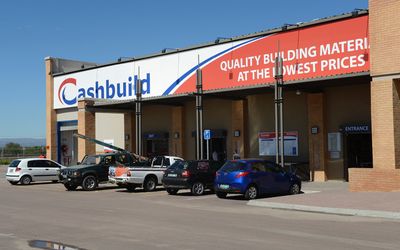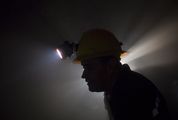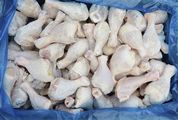CASHBUILD, a major retailer of building materials in Southern Africa, reported a "strong set of results" for the six months ended-December, excluding a once-off empowerment cost of R63m.
"It’s a pleasing set of results," CEO Werner de Jager said on Tuesday. He said it had grown its pipeline of products, keeping costs in check, and the gross margin intact.
"If (all this) comes in at the right level, it (positively) filters down to the bottom line."
Excluding the once-off costs, operating profit shot up 32% to R331m, resulting in a record operating profit margin of 7.3%, compared to the 6.3% achieved in the period to December 2014.
Revenue rose 14% to R4.5bn. Fifteen new stores that were opened after July 2014 contributed 3% to revenue growth, with the pre-existing 213 stores contributing 11% of revenue growth.
This increase was achieved in "tough trading conditions", the group said, as gross profit percentage was maintained at 23.7%.
The group, which sells directly to cash-paying customers through 228 retail outlets, gained shareholder approval in November to buy back 200,000 shares and distribute these — with a value of between R2,500 and R17,500 — to each Cashbuild Empowerment Trust beneficiary.
Mr De Jager said that the company’s empowerment actions had been a "great success story", providing R209m in a "constant flow" of dividends to staff since 2005.
While the R63m empowerment payout reined back profit, he said the true value of operations lay in the group’s trading operations, which turned over 15-million customers a year, many in townships and rural areas.
The effective tax rate for the period was 35%.
This was 6% higher than in the previous similar period, mainly due to an increase in nondeductible expenditure relating to the empowerment transaction.
He said home renovations were a big contributor to growth. But a weaker rand would push up prices, especially for imported products, such as power tools, and those with imported content.
On the domestic front, product inflation had been low at 2%. Stiff competition in SA’s cement markets enabled the group to keep prices in check for a product that made up 25% of sales revenues.
Business in Swaziland, Lesotho and Namibia was affected by generally poor economic conditions including drought, but Cashbuild saw growth in all nine SA provinces.
"Given the current economic environment and consumer malaise, I am astonished at the strength and resilience — again — of the Cashbuild results," Anthony Clark, small and medium market cap analyst at Vunani Securities, said yesterday.
"Their new drive to expand their footprint and compete in a marketplace which is under strain is testament to the quality of management and the business model," he said.

A Cashbuild outlet in Rustenburg, North West. Picture: MARTIN RHODES
CASHBUILD, a major retailer of building materials in Southern Africa, reported a "strong set of results" for the six months ended-December, excluding a once-off empowerment cost of R63m.
"It’s a pleasing set of results," CEO Werner de Jager said on Tuesday. He said it had grown its pipeline of products, keeping costs in check, and the gross margin intact.
"If (all this) comes in at the right level, it (positively) filters down to the bottom line."
Excluding the once-off costs, operating profit shot up 32% to R331m, resulting in a record operating profit margin of 7.3%, compared to the 6.3% achieved in the period to December 2014.
Revenue rose 14% to R4.5bn. Fifteen new stores that were opened after July 2014 contributed 3% to revenue growth, with the pre-existing 213 stores contributing 11% of revenue growth.
This increase was achieved in "tough trading conditions", the group said, as gross profit percentage was maintained at 23.7%.
The group, which sells directly to cash-paying customers through 228 retail outlets, gained shareholder approval in November to buy back 200,000 shares and distribute these — with a value of between R2,500 and R17,500 — to each Cashbuild Empowerment Trust beneficiary.
Mr De Jager said that the company’s empowerment actions had been a "great success story", providing R209m in a "constant flow" of dividends to staff since 2005.
While the R63m empowerment payout reined back profit, he said the true value of operations lay in the group’s trading operations, which turned over 15-million customers a year, many in townships and rural areas.
The effective tax rate for the period was 35%.
This was 6% higher than in the previous similar period, mainly due to an increase in nondeductible expenditure relating to the empowerment transaction.
He said home renovations were a big contributor to growth. But a weaker rand would push up prices, especially for imported products, such as power tools, and those with imported content.
On the domestic front, product inflation had been low at 2%. Stiff competition in SA’s cement markets enabled the group to keep prices in check for a product that made up 25% of sales revenues.
Business in Swaziland, Lesotho and Namibia was affected by generally poor economic conditions including drought, but Cashbuild saw growth in all nine SA provinces.
"Given the current economic environment and consumer malaise, I am astonished at the strength and resilience — again — of the Cashbuild results," Anthony Clark, small and medium market cap analyst at Vunani Securities, said yesterday.
"Their new drive to expand their footprint and compete in a marketplace which is under strain is testament to the quality of management and the business model," he said.






















Change: 1.36%
Change: 1.43%
Change: 1.71%
Change: 0.85%
Change: 3.32%
Data supplied by Profile Data
Change: 0.07%
Change: 0.20%
Change: 1.36%
Change: 0.00%
Change: 0.41%
Data supplied by Profile Data
Change: 0.69%
Change: 0.53%
Change: 0.62%
Change: 0.22%
Change: 0.92%
Data supplied by Profile Data
Change: 0.18%
Change: 0.21%
Change: 0.00%
Change: 0.39%
Change: -1.21%
Data supplied by Profile Data